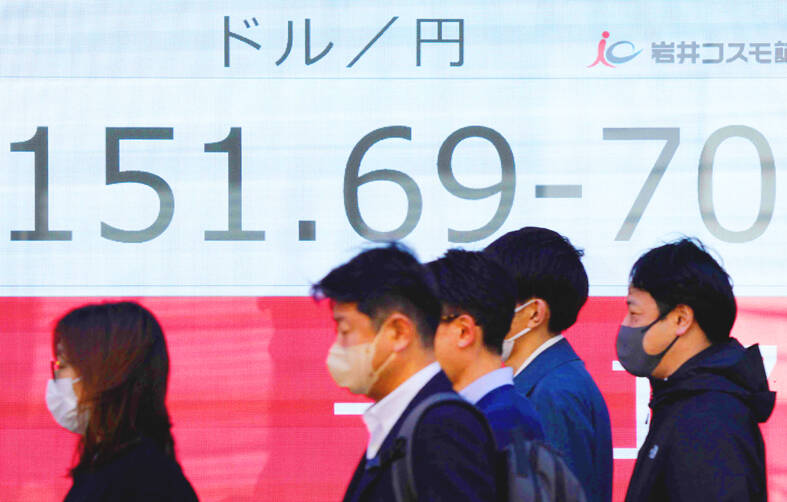The yen hit a 34-year low against the US dollar yesterday, just over a week after the Bank of Japan (BOJ) announced a much-anticipated interest rate hike in a shift away from years of ultra-loose monetary policy.
The Japanese currency weakened to ¥151.97 per US dollar, its lowest level since 1990, before recovering to about ¥151.35 later in the day.
The drop came after a top BOJ official suggested it would continue to pursue an accommodative policy, echoing previous comments from the central bank, but soon afterward, Japanese Minister of Finance Shunichi Suzuki said authorities would not hesitate to “take resolute action against excessive” foreign exchange moves — raising speculation of a government intervention to prop up the currency.

Photo: AFP
The BOJ last week took a step away from its unorthodox monetary stimulus program by hiking rates for the first time since 2007, but the yen has continued to slide.
Yesterday’s dip came after BOJ board member Naoki Tamura reportedly told business leaders in northern Japan that “slow, but steady progress” was needed on scaling back the central bank’s long-standing ultra-easy policy.
He repeated a line from a bank policy statement about financial conditions staying accommodative for now, which triggered fresh falls in the yen, Bloomberg News reported.
After the currency hit a 34-year low, Suzuki said the government was watching the situation closely.
“We’re monitoring market movements with a high sense of urgency. We will take resolute action against excessive moves, without ruling out any options,” Suzuki told reporters.
The Japanese government last intervened in markets to support the yen in October 2022, and on Monday a finance ministry currency diplomat also hinted that it could be on the cards again.
Further fueling speculation, BOJ officials held a rare meeting with the finance ministry and the Financial Services Agency (FSA) yesterday evening about “recent developments in financial markets,” a central bank spokesman said.
“The recent weakening of the yen cannot be said to be in line with fundamentals, and it is clear that speculative moves are behind the yen’s fall,” Japanese Vice Minister of Finance for International Affairs and top currency official Masato Kanda told reporters after the meeting.
“We will take appropriate action against excessive moves without ruling out any options,” he said.
Attending the meeting were Kanda, FSA Commissioner Teruhisa Kurita and BOJ head of policy Seiichi Shimizu.
ING Groep NV said in a note that foreign exchange markets would “test the verbal intervention of the last few days to see if there is more substance than just words.”
Royal Bank of Canada head of Asia foreign exchange strategy Alvin Tan (譚文泰) said that “intervention concerns” had capped the yen’s slide, but risks of further depreciation remain thanks to factors including “the yen’s sizeable yield disadvantage.”

Sweeping policy changes under US Secretary of Health and Human Services Robert F. Kennedy Jr are having a chilling effect on vaccine makers as anti-vaccine rhetoric has turned into concrete changes in inoculation schedules and recommendations, investors and executives said. The administration of US President Donald Trump has in the past year upended vaccine recommendations, with the country last month ending its longstanding guidance that all children receive inoculations against flu, hepatitis A and other diseases. The unprecedented changes have led to diminished vaccine usage, hurt the investment case for some biotechs, and created a drag that would likely dent revenues and

Macronix International Co (旺宏), the world’s biggest NOR flash memory supplier, yesterday said it would spend NT$22 billion (US$699.1 million) on capacity expansion this year to increase its production of mid-to-low-density memory chips as the world’s major memorychip suppliers are phasing out the market. The company said its planned capital expenditures are about 11 times higher than the NT$1.8 billion it spent on new facilities and equipment last year. A majority of this year’s outlay would be allocated to step up capacity of multi-level cell (MLC) NAND flash memory chips, which are used in embedded multimedia cards (eMMC), a managed

CULPRITS: Factors that affected the slip included falling global crude oil prices, wait-and-see consumer attitudes due to US tariffs and a different Lunar New Year holiday schedule Taiwan’s retail sales ended a nine-year growth streak last year, slipping 0.2 percent from a year earlier as uncertainty over US tariff policies affected demand for durable goods, data released on Friday by the Ministry of Economic Affairs showed. Last year’s retail sales totaled NT$4.84 trillion (US$153.27 billion), down about NT$9.5 billion, or 0.2 percent, from 2024. Despite the decline, the figure was still the second-highest annual sales total on record. Ministry statistics department deputy head Chen Yu-fang (陳玉芳) said sales of cars, motorcycles and related products, which accounted for 17.4 percent of total retail rales last year, fell NT$68.1 billion, or

In the wake of strong global demand for AI applications, Taiwan’s export-oriented economy accelerated with the composite index of economic indicators flashing the first “red” light in December for one year, indicating the economy is in booming mode, the National Development Council (NDC) said yesterday. Moreover, the index of leading indicators, which gauges the potential state of the economy over the next six months, also moved higher in December amid growing optimism over the outlook, the NDC said. In December, the index of economic indicators rose one point from a month earlier to 38, at the lower end of the “red” light.